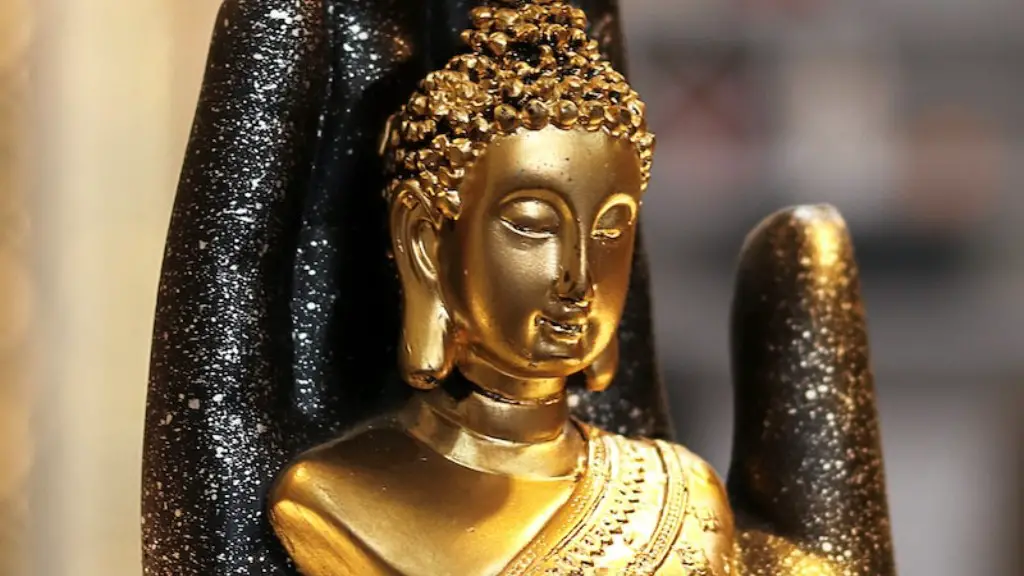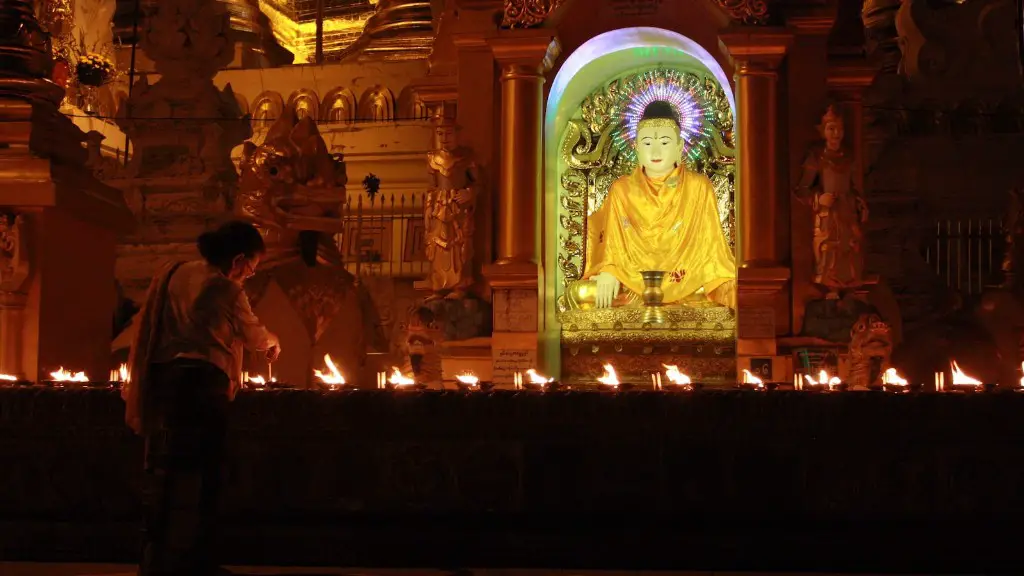What is Diwali in Hinduism?
Diwali is the most important festival in Hinduism, celebrated all over India with great joy and excitement. Diwali is celebrated for five days each year, usually corresponding to the Hindu lunar month of Kartik. It is celebrated in honor of Lord Rama and is also known as the “Festival of Lights”. During the festivities of Diwali, lights are lit everywhere, symbolizing the Inner Light, the candle of knowledge that dispels the darkness of ignorance.
Diwali is considered to be the strongest spiritual force in Hinduism. It is believed to bring luck and prosperity, as well as spiritual relief. Hindus celebrate Diwali to give thanks to Laxmi and Ganesha, who are the two most important Hindu gods. During Diwali, households and temples are filled with lights and decorations, signifying joy and happiness.
The celebration of Diwali dates back to ancient India, when the festival was observed in honor of the return of Lord Rama from his 14-year exile and victory over evil. Hindus believe that Lord Rama, his wife Sita, and his loyal brother Lakshman visited their homeland Ayodhya after defeating Ravana and returning from Lanka. When they arrived, their people lit rows of lamps (which is known as Diwali) to welcome them home.
The celebration of Diwali also has a deeper spiritual meaning. Hindus believe that Diwali symbolizes the victory of light over darkness and good over evil. This is the time when people clean and decorate their homes and perform rituals such as puja and firecrackers. The lighting of diyas is thought to rid homes of evil forces and invite prosperity.
The five days of Diwali have their own significance. On the first day, people worship the god of wealth and ask for prosperity. On the second day, Lakshmi Pujan is performed, and people make rangoli (a type of art) at the entrance of their houses. On the third day, people perform poojas and prayers to other gods and goddesses such as Ganesha and Saraswati. On the fourth day, people exchange gifts and visit their relatives and friends. On the fifth day, people decorate their houses with rangoli. The fifth day of Diwali is also known as Bhai Dooj, when sisters put tilak (a red paste made from turmeric and bael leaves) on the forehead of their brothers.
Diwali is not just a Hindu festival; it is celebrated by people of all religions. It is a time to share in the joy and happiness of spiritual awakening and to bring peace, harmony and prosperity to oneself and to everyone around them. Diwali is an occasion to celebrate the victory of good over evil and light over darkness.
Significance and Relevance of Diwali in Hinduism
Diwali holds a special significance and relevance in Hinduism, as it is a festival that celebrates the triumph of good over evil, knowledge over ignorance, and light over darkness. The festival commemorates the return of Lord Rama from his 14-year exile, when people lit rows of lamps to welcome him home. The lighting up of the lamps is symbolic of getting rid of evil spirits and inviting prosperity and joy into one’s life.
Diwali is also a special time for Hindus to offer prayers and seek forgiveness from the gods and goddesses – Lakshmi, Ganesha, Saraswati, Ganpati, and many more. It is believed that the gods are especially generous during Diwali, granting wishes and providing protection to their worshippers. Hindus also observe this festival to establish inner peace and to be in harmony with the universe.
The rituals and traditions of Diwali are mainly based on spiritual teachings, especially those related to inner cleansing, spiritual growth, and purification of the soul. People light lamps as a symbol of light over darkness, wisdom over ignorance, and peace over strife. Ancient texts suggest that during Diwali there is an uptick in spiritual energy, with divinity and purity in the atmosphere.
It is often said that Diwali is the time for Hindus to connect with their spiritual roots and pay respect to their ancestors. Diwali teaches us to appreciate the past, celebrate the present and look forward to a bright and prosperous future.
In a society that has become increasingly materialistic, Diwali gives us the opportunity to remind ourselves of the infinite blessings of the heavens and the powers that we can access on a daily basis. It is a reminder to be mindful of our actions and thoughts and to act with kindness and humility. It is a reminder to be grateful for the gifts of life, to respect the divine, and to nurture our spiritual sides.
The Mythology and Legends of Diwali
The festival of Diwali is steeped in mythology and legend. Hindus look to the Puranas, Upanishads and Itihasas for the stories behind the celebration of the five-day festival. Legends from the Ramayana and other ancient Hindu scriptures provide clues as to how and why Diwali is celebrated.
The most famous legend associated with Diwali is that of Lord Rama, his wife Sita, and brother Lakshman. According to Hindu belief, Lord Rama had gone into exile in the forest for fourteen years. He then returned home after defeating Ravana – the evil dictator of Lanka – and his army. People filled Ayodhya with light, joy and happiness to welcome him. To celebrate the victory of good over evil, lamps were lit everywhere, and the festival of Diwali was born.
The Ramayana also tells of how Lord Ganesha and Goddess Lakshmi emerged during the victory celebration. When Ganesha was born, he was given an elephant head by Lord Shiva as a sign of his divine power. According to Hindu traditions, it is believed that Lord Ganesha brings good luck and prosperity to households.
Goddess Lakshmi was born from the churning of the cosmic ocean and is worshipped as the goddess of wealth, fortune and prosperity. Prayers are offered to her for spiritual and material growth in the family. She is the source of all wealth, success, and prosperity, and those who seek her blessings are blessed with abundance.
The story of Diwali is not only an ancient myth; it is a reminder to all of us to fight evil and to protect the good. It serves to remind us that, with dedication and hard work, any obstacle can be overcome.
Diwali Celebrations
Diwali is an occasion of joy and celebration throughout India. People dress in their best clothes, worship the gods and goddesses, light diyas and candles, and exchange gifts with their loved ones. Families gather together to prepare delicious dishes and sweets. The night of Diwali is a grand affair, with members of the family gathering around to share in each other’s happiness.
The most popular form of celebration during Diwali is the exchange of gifts. Many families exchange traditional gifts such as clothes, sweets, jewelry, and cash. People also enjoy the colorful displays of fireworks and the exciting traditions of playing cards, exchanging gifts, and preparing sweet dishes. Fireworks are a way to ward off the demons and bring luck to one’s home.
Exchanging and giving of traditional gifts is seen as an offering of love and affection. People express their kindness and gratitude to their near and dear ones by transmitting lovable messages and warmth through the process of exchanging gifts.
Diwali is also a time to indulge in religious activities such as prayers, pilgrimage, and meditation. During Diwali, people visit temples to seek blessings and engage in poojas (religious rituals) with their families. While the outer celebrations lend cheer, the real Diwali is celebrated in the inner sanctum of the heart with spiritual prayers. The ambition and the purpose of Diwali is to see the light of divine within oneself.
Symbolism of Diwali
Diwali is filled with symbols that reflect the philosophical and spiritual teachings of Hinduism. The spiritual symbolism of Diwali starts with the ritual of Deepawali – the lighting of lamps – which symbolizes the victory of knowledge over ignorance. Deepawali means the row of diyas, which are small lamps filled with oil and lit during the evening. It is a reminder of the inner light that dispels ignorance and brings success, prosperity, and well-being.
Diwali is also a time of cleansing and purifying. People clean their homes so that they can make a fresh start to the New Year. They also clean their minds and hearts, so that they can start anew with a clean slate and install the spirit of love and peace. This is the true essence of Diwali.
The exchange of gifts reflects the spirit of giving and sharing. People give gifts such as clothes, sweets, and jewelry to express love and gratitude to their loved ones. This is a sign of appreciation, understanding, and mutual respect.
The festival of Diwali is also deeply symbolic for Hindus. They use the symbolism of Diwali to express their disagreements between members of a family or society, and to bridge the gap between them. And it is through this symbolism that people learn the value of love and tolerance in a diverse society.
Conclusion
Diwali is a highly significant festival in Hinduism. Every aspect of it – the religious rituals, decorations, and the exchange of gifts – has a spiritual meaning and a deep relevance in Hinduism. It is a time for Hindus to pay homage to the gods and goddesses, bring peace to the world, and seek blessings for a prosperous future. The symbols associated with Diwali instill within us the values of love, harmony, and good will, and remind us of the importance of celebrating the triumph of light over darkness.

